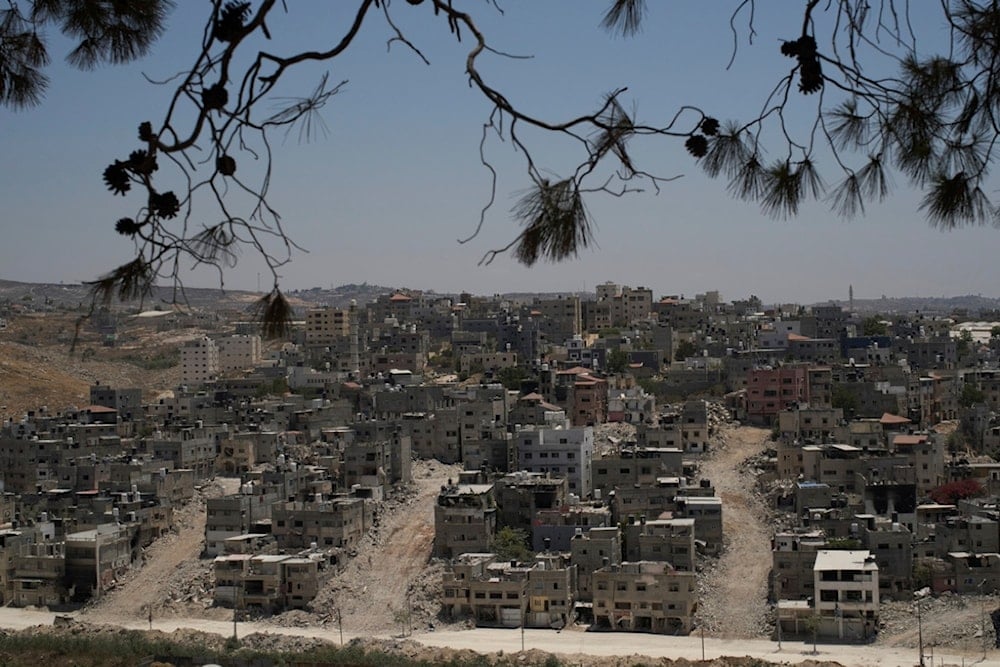Israeli assault on West Bank continues, leaving over 40,000 displaced
Tens of thousands of Palestinians are displaced as Israeli forces demolish homes in Tulkarm refugee camps, while human rights groups warn of West Bank annexation as military tactics mirror Gaza war strategy.
-

Destroyed houses during the Israeli aggression are seen at the Nur Shams refugee camp, in the West Bank city of Tulkarm, on July 2, 2025 (AP)
Israeli occupation forces (IOF) began demolishing homes in the Tulkarm refugee camp in the occupied West Bank, as their rightful residents stood, notably Mahmoud Lutfi, contemplating what belongings to save before their houses were reduced to rubble.
A report published by Reuters on Wednesday detailed that the 51-year-old father of six managed to rent a small room in the nearby city of Tulkarm, which remains an unsustainable option because he has no source of income. "I can’t access my electronics repair shop inside the besieged camp," he said, raising concern over how he will support his family.
“We were displaced on January 27, 2024. They evicted us and told us not to return. It’s been six months and we still can’t go back,” Lutfi told Reuters.
Most residents, he said, fled with nothing. “If you try to go back to get your things, you risk being shot or arrested. Even when coordination allows a brief visit, you barely have time to retrieve anything.” He added that many families were worse off, forced to live in overcrowded schools or on agricultural land, surviving only on aid.
Over 40,000 Palestinians displaced
According to Israeli rights group B’Tselem, Israeli offensives have displaced tens of thousands of Palestinians in the occupied West Bank, including from Tulkarm, Nur Shams, and Jenin camps. The organization estimates that over 40,000 Palestinians have been forcibly uprooted in 2024 alone.
The Israeli military claimed the demolitions are aimed at combating Palestinian Resistance groups and said the destruction was "operationally necessary" to allow troops to move freely. However, the demolitions have triggered widespread international condemnation and raised alarms over what many see as an organized effort to annex the West Bank, which "Israel" occupied in the 1967 war.
This week, Reuters witnesses saw bulldozers clearing away debris from flattened homes and expanding roads surrounded by rubble. Residents scrambled to pile salvaged furniture, bedding, and cooking utensils onto trucks.
Tulkarm Governor Abdullah Kamil said demolitions have surged in recent weeks, with 106 homes and 104 other buildings destroyed in Tulkarm and Nur Shams camps.
"What’s happening in Tulkarm is a continuous crime driven by a political decision from 'Israel'. This has nothing to do with security," Kamil stated, adding that "The infrastructure is in ruins. The camp is now a ghost town inhabited only by snipers stationed at multiple points."
West Bank tactics echo Gaza war
The assault, which began in January, is one of the largest in the West Bank since the Second Intifada over two decades ago. It involves ground forces backed by drones, helicopters, and, for the first time in years, heavy tanks.
While efforts intensify to reach a ceasefire in Gaza, despite persistent Israeli obstruction, international rights groups are also expressing deep concern over escalating violence in the West Bank.
Shai Barnes, communications director at B’Tselem, warned that "Israel is replicating the tactics used in Gaza, large-scale destruction of homes and civilian infrastructure, and forced displacement of civilians from designated combat zones."
Additionally, far-right voices in the Israeli government have openly called for the formal annexation of the West Bank. That said, Governor Kamil said the displacement crisis is adding pressure to an already struggling society, adding that thousands have taken shelter in mosques, schools, and crowded relatives' homes.
Returning to the camp for the first time in six months, Lutfi was devastated by the scale of the destruction, stressing that "Most people who come back find their homes leveled. The damage is massive — wide roads, collapsed infrastructure, no electricity, no internet. Rebuilding this will take a very long time."
Read more: Gaza isn’t alone: West Bank suffers in shadow of ongoing Israeli war

 4 Min Read
4 Min Read









